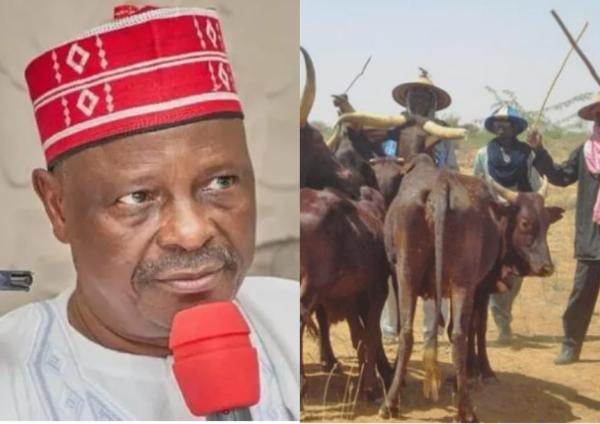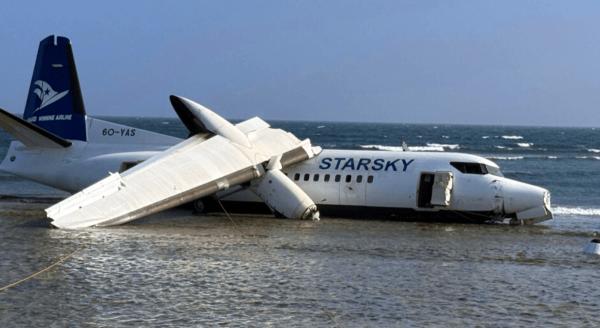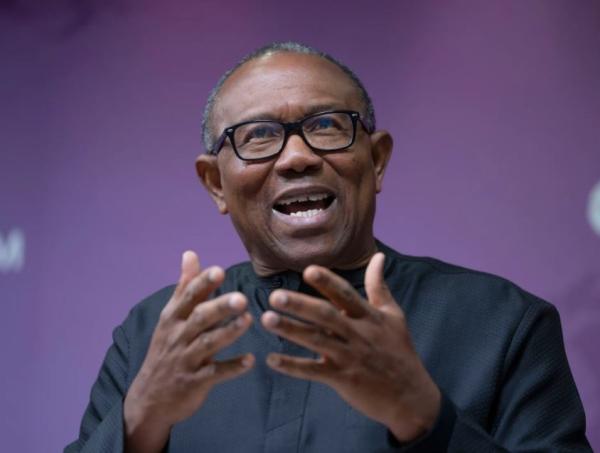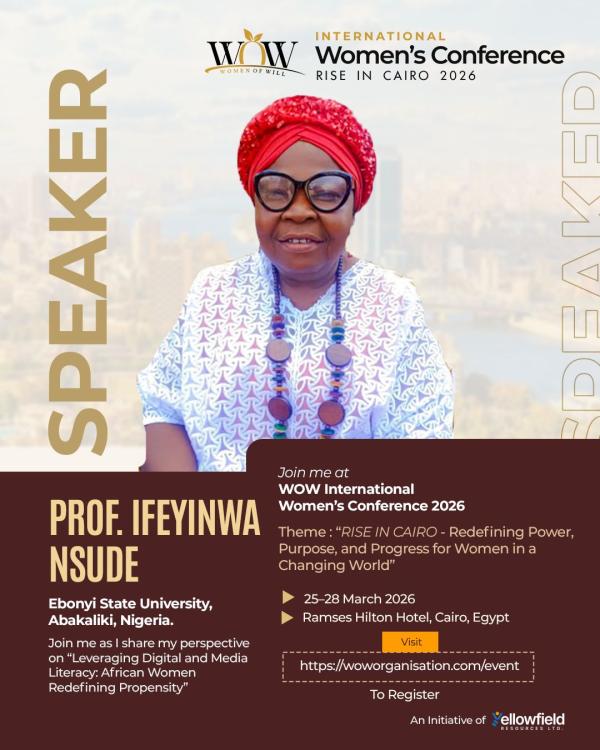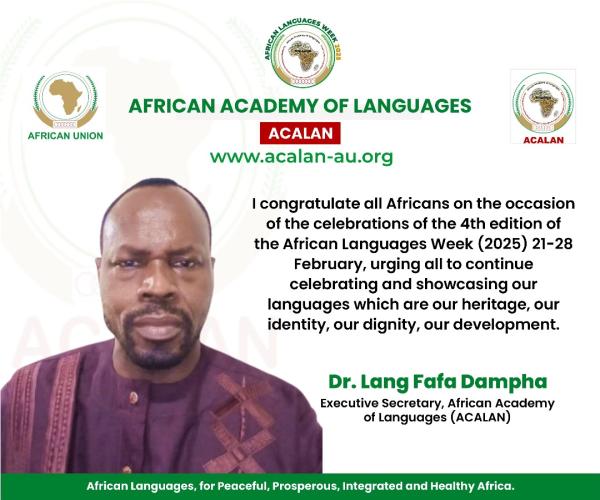
February 22, 2025, marks the beginning of the fourth edition of the celebration of the African Languages Week. The Executive Secretary of the African Academy of Languages, (ACALAN) Dr Lang Fafa Dampha comprehensively gives insight on the African Languages Week.
Excerpt from an Exclusive Interview with Prince Cletus Ilobanafor of CEOAFRICA
Cletus: You are welcome Dr Dampha
Thank you very. I wish you and all a Happy and blessed ALW
Cletus: What is the African Languages Week?
The African Languages Week was launched as a major annual event that aims to increase awareness and appreciation of African languages by examining pragmatic ways to empower them and make them relevant to the lives of Africans. The African Languages Week also aims to promote the dynamics of African worldviews and philosophies of life, through the empowerment and use of African languages, and to demonstrate the indispensable role of African languages in the integration and sustainable peace and development in Africa. The African Languages Week is also geared toward taking stock of how African languages are faring in the world of global languages to see where we stand in our language development endeavours. During the African Languages Week, various activities take place to promote and empower African languages, including showcasing cultures across the continent.
Cletus: The Africa Languages Week was initially scheduled for January 24 to 30; why has it been changed to February 21 to 28?
Yes, initially when I presented the proposal to the Specialised Technical Committee, Youth, Culture and Sport, we had proposed 24 to 30 January due to the fact that the Mission for the African Academy of Languages (MACALAN), began operating on January 24 2001, when former Presi-dent of Mali, H E Alpha Oumar Konaré established it by Presidential Decree on December 19 2000. President Konaré subsequently became the first Chairperson of the African Union after its transformation from OAU to AU in 2002.
However, after the inaugural edition, we have encountered some difficulties in smoothly marking the event. Firstly, that initial period usually coincides with the resumption of many from Christmas and the New Year holidays. At the African Union also, many things are not yet finalised. Secondly African Union summits usually take place during this period, which further makes things difficult for us. After consultation, we thought that it would be more convenient to have the dates moved a little further.
During the 4th STC-YCS that took place at the African Union Commission from 22 to 26 May 2023, I presented the proposal for the change of dates and the reasons to the committee of Honourable Ministers, that adopted it unanimously.
The proposal was further adopted by the 43rd Ordinary Session of the Executive Council during the 5th Mid-Year Coordination Meeting of the African Union, Regional Economic Communities and Regional Mechanisms, which took place from 13 to 16 July 2023, in Nairobi, Kenya. At the same mid-year coordination meeting the final adoption was done by the Heads of State and Government. From the third edition (2024), the African Languages Week is officially programmes from 21 to 28 February. ACALAN’s proposal for a Decade of African Languages alongside the UN International Decade of Indigenous Languages 2022 – 2032 to be implemented within ACALAN’s mandate and programmes was also adopted, as well as our proposal to revise the African Union’s Language Plan of Action for Africa to incorporate the Assembly Decision on Kiswahili as a Working Language of the AU and Language of Wider Communication in Africa.
We will note now that, the African Languages week now coincides with the United Nations Mother Language Day, which will make it easier for the African countries to mark both events whose objectives are not different.
How did the African Languages Week come about?
The African Academy of Languages (ACALAN) is the specialised language agency of the African Union, whose mission is to develop and promote the use of African languages as a means of fostering the integration and socio-economic development of the continent. ACALAN is responsible for empowering African languages so that they can be used in all domains by encouraging the formulation and implementation of dynamic and articulated language policies, as well as the sharing of experiences in policy development and implementation in the African Union Member States as a means of using African languages in a wider range of domains. The Secretariat under my leadership, came up with two major proposals in 2017 and 2018: (I) the African Languages Week proposal and (II) Kiswahili as a Working Language of the African Union and Language of Wider Communication in Africa. One day I was invited to speak online in the celebration of the Chinese Language Day on April 20;
I have always been called to take part in language day and week celebration events. After presenting my paper on behalf of the African Union, I sat in my office and talked to myself, “You always go and talk about the importance of commemorating non-African languages, what about African languages? Then I started researching how the celebration of these languages is presented. It was in this manner in late 2017, that I formulated the proposal and the then Senior Project and Programme Officer, Dr Ojo Babajide Johnson and I fine-tuned it. The proposal was presented to the Governing Board which is ACALAN’s Highest Policy Organ for endorsement; then it was presented to the African Union's Third Specialised Technical Committee on Youth, Culture and Sport (STC-YCS3) in October 2018 in Algiers, Algeria, which unanimously adopted it. After its adoption by the Executive Council and the subsequent endorsement of the Heads of State and Government of the African Union, we proudly launched the African Languages Week in collaboration with the Government of Burkina Faso in Ouagadougou in July 2021.
How is the commemoration planned?
At the Ouagadougou launching, one of the major recommendations was that ACALAN should establish a continental standing committee to assist the Secretariat in the planning and organisation of the event. A twenty-five member African Languages Week Coordinating Committee (ALWCC), composed of members from the five regions of Africa and its Diaspora was immediately established respecting the African Union’s policy of regional spread. The committee was coordinated by Professor Wangui Wa Goro, a Kenyan academic, social critic, researcher, translator and writer;
during the inaugural edition of the African Languages Week in 2022. She was succeeded by Mrs Margaret Nankinga from Uganda, also Coordinator of ACALAN’s Luganda / Lusoga / Lugwere Vehicular Cross-border Language Commission.
The main role of the Committee is to stimulate more dynamism for the development and promotion of African languages across the African continent and in the African Diaspora.
The Committee assists ACALAN in the annual celebration and ensures the smooth running of the activities of the African Languages Week by proposing the theme for each year; and mobilising resources (human, technical and financial) for planning and organising the activities of the week throughout the continent and in the Diaspora, in collaboration with National Language Structures in the Member States serving as ACALAN’s national focal institutions, through communication, advocacy and lobbying.
What is the theme of this year’s edition?
In 2022, which was the inaugural edition, the African Languages Week Coordinating Committee identified the theme as: “African Languages Levers for the Africa We Want” in line with the Africa Union theme for 2021. In 2023 the committee chose: “African Languages for Sustainable Food Security, Cultural and Socio-economic Development for the Africa We Want” also in line with the Africa Union theme for 2022. The theme of the third edition was: “Empowering African Languages for Quality Education and Free Trade for the Africa We Want” reflecting again on the themes of the African Union for 2023 and 2024, which are: “Acceleration of the African Continental Free Trade Area (AfCFTA)”, and “Educate and Skill Africa for the 21st Century”, respectively.
The ALWCC also identified five sub themes for the 2024 edition of the African Languages Week:
- Developing and Implementing Policies for African Languages Empowerment;
- Multilingualism for Quality Education and Free Trade Across Africa;
- African Languages as Foundation for Literacy and Education in Africa;
- Cross-border Languages as Levers for Digitalisation and Free Cross-border Trade in Africa;
- Literacy is the Ability to Read and Write in the Mother Tongue.
The Committee also identified two key activities that if carried out by all AU Member States, would mobilise Africa’s populace and governments to achieve the objectives of the theme. The two events are:
- Public talks through which committee members and members of the civil society will work with governments and Non-Governmental Organisations to organise public talks on empowering African languages for quality education and free trade;
- Media campaigns on African language promotion to urge parents and caregivers to buy books in African languages for their children and community libraries (book donations and children’s reading competitions, inclusive).
The theme for this fourth edition (2025) is: " African Languages: Voices for Reparations, Justice and the Dignity of the People for the Africa We Want."
And the sub-themes are::
- African languages, voices for the restoration of the dignity of people of African descent;
- Breaking the Chains of Language Oppression: Reparations and Language Empowerment for Africans and People of African Descent;
iii. Promoting African languages for digital inclusion, transformation and social justice.
The slogan for this year’s edition is: My language: my heritage, my dignity
Cletus: What are you telling Africans about this year’s commemoration?
The African Languages Week is an awareness call. Therefore, we, Africans, have to be dedicated to the promotion of African cultures and Languages. The African Languages Week is a time of reflection, suggestions, propositions, efforts and action to develop African languages and promote their use as a factor of African integration and development, peace and prosperity. The fact that Africa is the most linguistically diverse continent in the world, we cannot continue to rely on the former colonial languages that only about 30 per cent of Africans understand and use to the detriment of African languages the majority understand best and use. We are emphasising that ACALAN is not against any language. We acknowledge that all languages are important to their speakers especially. Languages are assets, particularly to their speakers. All languages are partner languages for ACALAN. However, we cannot continue to rely on foreign languages that only a small portion of the African population understands and use; to the detriment of African languages that most people understand best and use.
I would like to emphasize that cultural development is inevitably one of the main factors in the sustainable development of a people. The development of African languages as one of the main pillars of African cultures is therefore an indispensable factor in Africa's integration and development. We therefore call on our leaders and policymakers to provide the necessary support for our efforts to develop and promote our values and cultures. We also call on civil society to double their effort so that African languages can become effective working and official languages and languages of instruction in the existing multilingual context.
Long live the AU
Long Live ACALAN
Long Live the ALW












